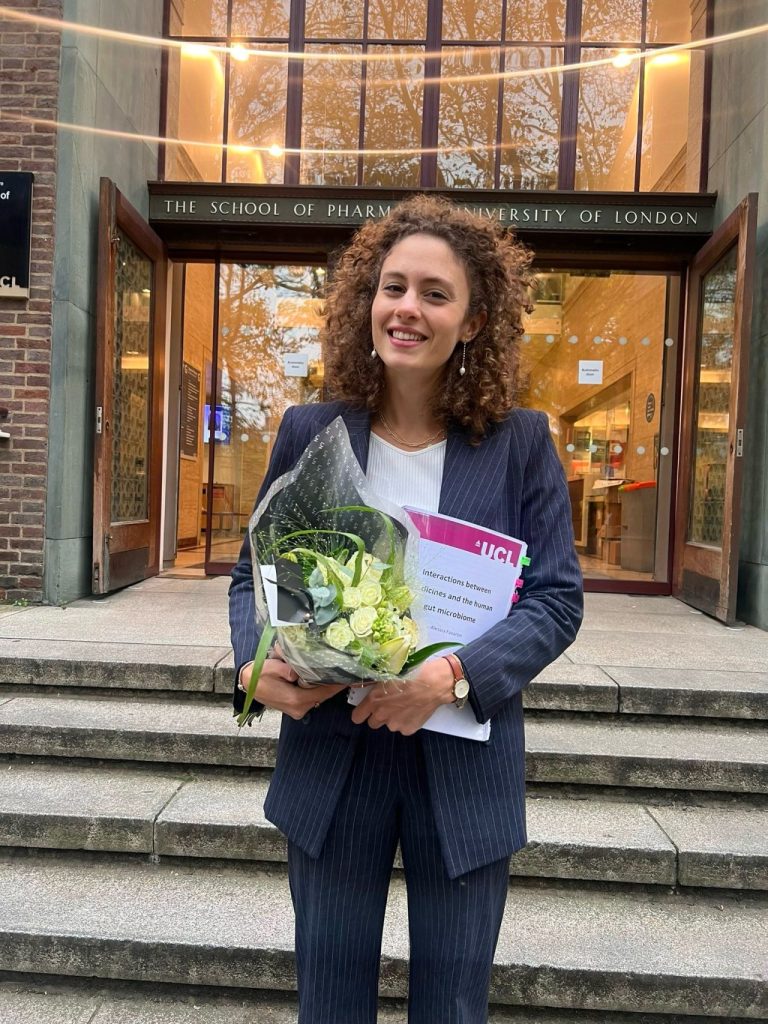A significant academic milestone was achieved on the 6th of November, 2024 as Alessia, a COLOTAN doctoral candidate at University College London , successfully defended her PhD thesis titled “Interactions between medicines and the human gut microbiome”. The defense marked the culmination of years of hard work and research in the field of gut microbiota. Here’s Alessia on her proud moment:
“After three incredible years of professional and personal growth, I have successfully completed my PhD at University College London. My research investigated the interactions between the human gut microbiome and medicines, focusing on anti-inflammatory drugs prescribed for inflammatory bowel disease (IBD). I developed both in vitro and in silico methods to study these interactions, enabling the prediction of drug concentrations in the colon, assessing their impact on the gut microbiome, and evaluating their susceptibility to microbial depletion. By incorporating these insights into the drug development process, my work aims to facilitate more targeted and microbiome-conscious therapeutic strategies, particularly for conditions like IBD, where the microbiome plays a critical role.
The rapid advancements in microbiome research over the past few years have significantly influenced the direction of this PhD. My hope is that this work, in some small way, contributes to the momentum of discoveries in this exciting field. This journey has been enriched by the publication of valuable research articles, oral and poster presentations at international conferences, and a rewarding four-month placement at Pfizer UK.
I am immensely grateful to the European Union’s Horizon 2020 research and innovation programme, COLOTAN-ETN, for their support and excellent training opportunities. A heartfelt thank you to the professors and colleagues involved in the project for their guidance, encouragement, and for sharing their passion for science throughout this journey.”
The COLOTAN team congratulates her and looks forward to follow the continued impact of her achievement.
Abstract:
In recent years, there has been increasing evidence of the critical role the human microbiome plays in maintaining host health. However, interactions between gut microbiota and commonly prescribed medicines remain a research area mainly underexplored. This thesis investigates these interactions, focusing on anti- inflammatory drugs, specifically Janus kinase (JAK) inhibitors and sphingosine 1- phosphate (S1P) receptor modulators, which are approved for the treatment of inflammatory bowel disease (IBD). The first part of this work assessed the effects of these drugs on the gut microbiota sourced from a healthy human donor. Using isothermal microcalorimetry, optical density measurements, and metagenomics, it was found that JAK inhibitors (tofacitinib citrate, baricitinib, and filgotinib) had minimal impact on microbial growth and function. In contrast, the S1P receptor modulator ozanimod, significantly altered bacterial composition, promoting the growth of Enterococcus, a species linked to IBD. Given that these drugs are approved for IBD, it was essential to test them in a more clinically relevant environment. In collaboration with ProDigest, the short-term colon model was used to simulate the gut microbiota of IBD patients. Tofacitinib citrate was tested in this model and demonstrated a reduction in specific pro- inflammatory markers, underscoring its therapeutic potential for managing IBD- related inflammation. Lastly, as drug effects on the gut microbiota are concentration- dependent, physiologically based pharmacokinetic (PBPK) modelling, coupled with in vitro dissolution testing, was employed to predict the clinically relevant concentration in the large intestine of the JAK inhibitor upadacitinib, from its modified-release formulation. The predicted concentration showed no significant adverse effects on bacterial growth.
Overall, this thesis highlights the importance of studying drug-microbiome interactions in IBD therapy, particularly with clinically relevant drug concentrations, as these drugs can induce gut dysbiosis or be depleted by gut bacteria, potentially impacting the host’s health and treatment outcomes.



